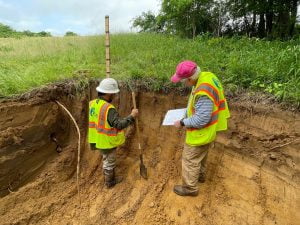
Stormwater management is a crucial aspect of maintaining the environmental health of any urban area. In Corpus Christi, Texas, obtaining a stormwater permit is essential for individuals or organizations involved in construction projects or other activities that may impact drainage systems and water quality. Understanding the importance of a stormwater permit and the process of obtaining one is vital to ensure compliance and protect the local environment.
Understanding the Importance of a Stormwater Permit
Stormwater management plays a significant role in Corpus Christi’s sustainability and resilience efforts. By implementing stormwater control measures, the city aims to minimize the potential adverse effects of urban runoff on water bodies and natural ecosystems.
Stormwater permits are issued to regulate and monitor activities that may contribute to water pollution, such as construction, industrial processes, and land development. These permits outline specific requirements and guidelines that individuals and organizations must follow to minimize their impact on water quality and ensure compliance with local regulations.
The Role of Stormwater Management in Corpus Christi
In Corpus Christi, stormwater management involves the planning, design, and operation of various structures that manage rainfall runoff and prevent pollutants from entering storm drains and natural water bodies. This includes detention ponds, infiltration basins, and other stormwater control measures.
By effectively managing stormwater, Corpus Christi aims to reduce flooding risks, protect water quality, and maintain the overall ecological balance of the region. The City’s stormwater management program strives to enhance both the built and natural environments and promote sustainable development.
Environmental Implications of Stormwater Permits
Stormwater runoff, if left uncontrolled, can carry contaminants such as sediment, chemicals, and debris into local water bodies. These pollutants can harm aquatic life, degrade water quality, and negatively impact recreational activities. Proper stormwater management through permitting helps mitigate these risks by establishing regulations for ongoing monitoring, maintenance, and responsible construction practices.
By obtaining a stormwater permit, individuals and organizations demonstrate their commitment to environmental stewardship. Compliance with permit requirements ensures that activities are carried out in a manner that minimizes potential harm to the environment and ensures long-term durability and sustainability.
The Process of Applying for a Stormwater Permit in Corpus Christi
Obtaining a stormwater permit in Corpus Christi involves several steps to ensure compliance and facilitate the smooth operation of construction projects or other activities. Familiarizing yourself with the pre-application, application, and post-application procedures will help you navigate the process more effectively.
Pre-application Steps for a Stormwater Permit
Prior to submitting a stormwater permit application, it is essential to gather all the necessary information and documentation. This typically includes project plans, site maps, and any relevant environmental impact assessments. Additionally, it is advisable to seek guidance from professionals who specialize in stormwater management to ensure your application meets the regulatory requirements.
Engaging with local agencies and organizations can also provide valuable insights and assistance in understanding the specific stormwater regulations applicable to your project. Their expertise and experience can contribute to a smoother permit application process.
Filling Out the Stormwater Permit Application
Completing the stormwater permit application accurately and comprehensively is crucial for successful project implementation. The application form typically requires detailed information on project scope, potential sources of pollutants, methods for erosion and sedimentation control, and proposed drainage management measures.
While filling out the application, it is important to provide all required supporting documents, such as project drawings, construction schedules, and any relevant environmental reports. Attention to detail and adherence to the specific submission guidelines will help expedite the review and approval process.
Post-application Procedures and Expectations
Once the stormwater permit application is submitted, the regulatory authority will review the documentation and assess the proposed measures for compliance with local stormwater management regulations. It is essential to be prepared for potential inspections and inquiries from the authority during the review process.
If any revisions or modifications to the proposed measures are requested, prompt action should be taken to address these concerns. Effective communication and collaboration with the regulatory authority are essential to ensure a satisfactory resolution and timely approval of the stormwater permit.
Common Challenges in Obtaining a Stormwater Permit
While obtaining a stormwater permit is a necessary step toward complying with local regulations, several challenges may arise during the application process. Being aware of these challenges and knowing how to address them can help mitigate delays and ensure a successful permit acquisition.
Dealing with Application Rejections
In some instances, stormwater permit applications may be rejected due to incomplete or inaccurate information, non-compliance with regulations, or failure to provide sufficient supporting documentation. To avoid these rejections, it is essential to thoroughly understand the submission requirements and carefully review the application before submission.
If an application is rejected, it is important to carefully review the reasons for rejection provided by the regulatory authority. Taking prompt action to rectify the identified deficiencies and resubmitting the application with the necessary amendments is crucial to avoid further delays.
Overcoming Documentation Issues
One common challenge in the stormwater permit application process is gathering and providing the required documentation. This may involve obtaining various reports, survey data, construction plans, and other relevant information. Delays in obtaining or submitting these documents can hinder the progress of the permit application.
To overcome documentation issues, it is advisable to plan ahead and initiate the data collection and report preparation required for the stormwater permit application well in advance. Working closely with professionals experienced in stormwater management can help streamline this process and ensure that all necessary documentation is prepared accurately and on time.
Maintaining Compliance with Stormwater Permit Regulations
Once a stormwater permit is obtained, it is essential to understand and fulfill the requirements outlined within it to maintain compliance. Regular inspections and reporting play a crucial role in fulfilling these obligations.
Regular Inspections and Reporting
The regulatory authority may conduct periodic inspections to verify that stormwater control measures are being implemented correctly and maintained as required. These inspections aim to ensure ongoing compliance with the permit conditions and to identify any potential issues or non-compliance.
When the authority conducts inspections, prompt action should be taken to address any concerns or recommended improvements. Additionally, keeping accurate records of any maintenance activities related to stormwater control measures is essential for reporting back to the regulatory authority.
Renewing Your Stormwater Permit
Stormwater permits typically have a limited duration, after which they need to be renewed to maintain compliance. It is important to be aware of the permit expiration date and initiate the renewal process well in advance to minimize disruption to ongoing activities.
When renewing a stormwater permit, it is crucial to review any changes in regulations or permit requirements that may have occurred since the original issuance. Updating and modifying stormwater management practices, if necessary, will help ensure continued compliance with the evolving regulatory landscape.
Resources for Stormwater Permit Application and Maintenance
Obtaining assistance and guidance from relevant agencies, organizations, and online resources can significantly contribute to a successful stormwater permit application and ongoing compliance.
Local Agencies and Organizations for Assistance
The City of Corpus Christi’s stormwater management division, along with other local agencies and organizations, can provide valuable assistance and information related to stormwater permits. Contacting these entities will allow access to specific regional knowledge and expertise to ensure compliance with local regulations.
Online Resources for Stormwater Permit Information
Several online resources provide comprehensive information and guidelines for stormwater permit applications and ongoing compliance. These resources often include permit application forms, regulatory documents, best practices, and case studies. Navigating these platforms can furnish valuable insights for successfully navigating the stormwater permitting process.
By understanding the importance of stormwater permits, knowing the application process, and actively maintaining compliance with permit regulations, individuals and organizations can contribute to the resilient and sustainable development of Corpus Christi, Texas. As an essential element of environmental stewardship, stormwater management safeguards local water resources, reduces flooding risks, and helps preserve the natural beauty of the area for future generations.
If you’re ready to move forward with your stormwater permit in Corpus Christi, TX, and want to ensure that your project adheres to the latest environmental regulations and best practices, look no further than ESE Partners. Our team of environmental experts is equipped to handle all your water compliance needs with efficiency and expertise. From stormwater permitting to water sourcing and wastewater reporting, we’ve got you covered. With the USACE changing their review process for DA permit applications in the Galveston County District, now is the time to secure an experienced environmental consultant. Let ESE Partners be your guide to navigating these changes and optimizing your environmental strategy. Request A Proposal today and take the first step towards environmental compliance and sustainable business growth.








